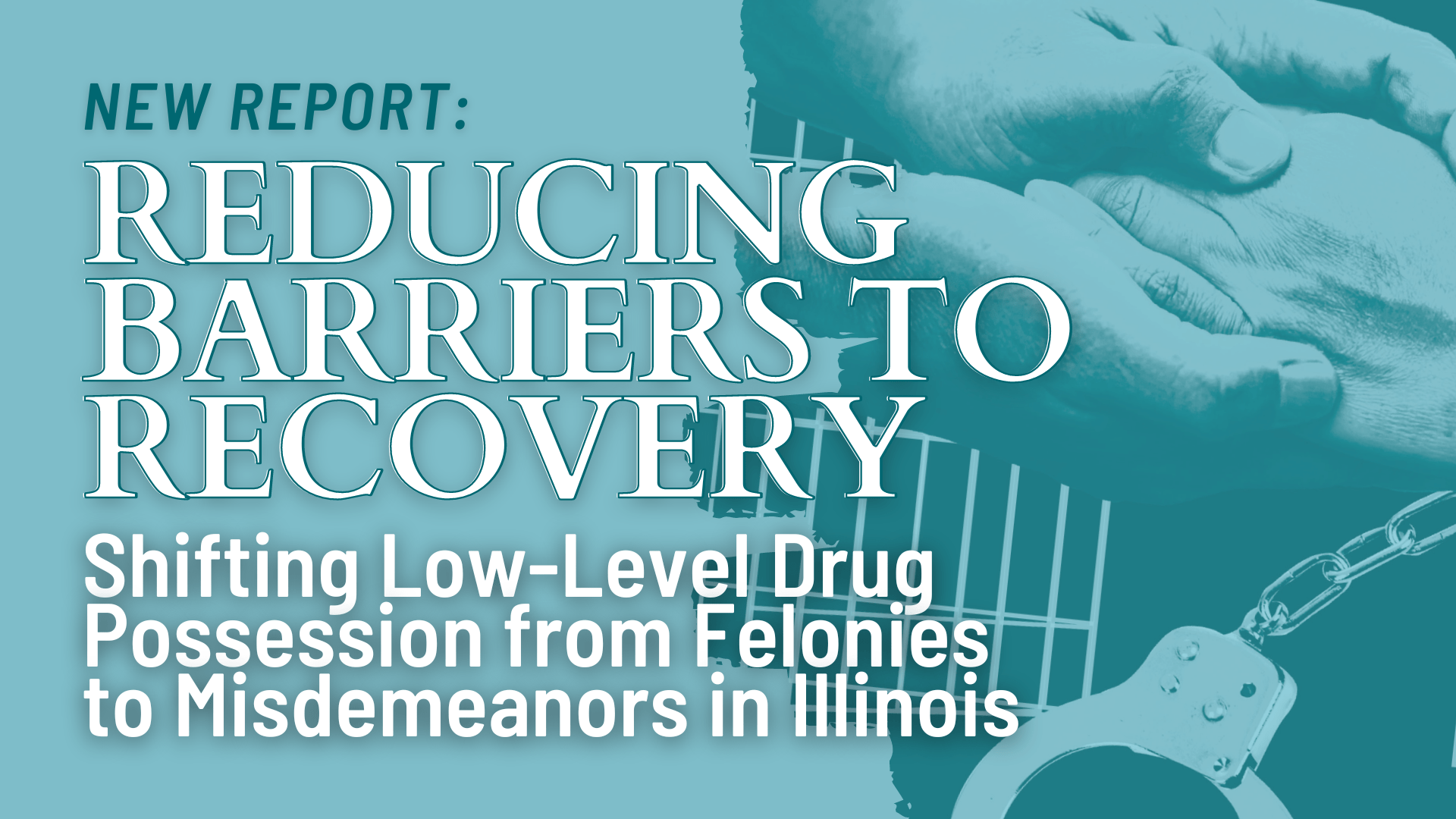REPORT: Reducing Barriers to Recovery — Shifting Low-Level Drug Possession from Felonies to Misdemeanors in Illinois
Chicago Appleseed Center for Fair Courts, the ACLU of Illinois, the Cook County Department of Public Health, and the Illinois Justice Project have released our joint report, Reducing Barriers to Recovery – Shifting Low-Level Drug Possession From Felonies to Misdemeanors in Illinois. Our report provides solutions to alleviate the suffering caused by our state’s current drug laws, which hinder people’s paths to recovery, and recommends that Illinois implement a public health approach to reduce the harms caused by criminalizing drug use, shift resources away from the failed strategies of incarceration and punishment, and reclassify simple possession (possession of a controlled substance where the person is not engaged in the sale or delivery of drugs to another person) from a felony to misdemeanor.
Illinois is one of 18 states that makes possession of drugs (except cannabis) a felony in all cases, which means that possession—even of very small amounts of drugs—can lead to serious criminal legal system involvement and long-term consequences.
The Reducing Barriers to Recovery report recommends reclassifying simple possession of a personal use quantity of a controlled substance from a felony to a Class A misdemeanor. These recommendations are supported by the public. In a recent poll conducted by the ACLU of Illinois, 79% of Illinois voters agreed that the state should reduce the penalty for low-level drug possession from a felony to a misdemeanor for all drug offenses. Likewise, we build on the findings of Illinois State Commission on Criminal Justice and Sentencing Reform—a bipartisan group of judges, legislators, directors of state agencies, prosecutors, public defenders, law enforcement, and researchers—which reviewed the Illinois drug sentencing practices and recommended in 2016 that “sentences for drug possession and most other drug offenses should be reduced by one class, and that mandatory minimums should be eliminated for many drug offenses.”
Illinois’ current punitive laws have not prevented or decreased drug use. In 2019, 13% of people in Illinois prisons were incarcerated for drug law violations.
The carceral focus of the War on Drugs disproportionately harms Black and Brown Illinoisans, who are already more likely to be brutalized by the legal process and whose communities are systematically harmed by over-policing and mass incarceration for drug-related charges. In June, Chicago Appleseed analyzed a variety of Chicago, Cook County, and statewide data on drug possession and arrests and found – among other things – that Black communities are disproportionately impacted by searches, arrests, and incarceration for drugs. In Chicago, Black people make up 29.2% of the population, but are involved in 61.2% of traffic stops, 68.9% of pedestrian stops, and 77.4% of all drug crime arrests. In Cook County as a whole, 63.7% of all charges for possession were against Black people and a shocking 91.6% of people charged with “delivery/possession with intent to deliver” were Black (compared to 23.8% of the overall Cook County population).
The ongoing War on Drugs has caused significant damage to our communities. Since the 1980s, Illinois has increased penalties of drug offenses at least eight times—while simultaneously denying people who use substances the resources and help that they need to recover and avoid relapse.
Incarceration is inherently traumatizing, and these traumas are compounded by the punishments people face even after they have served their time. Illinois has thousands of laws that make it harder for people with felony convictions to find jobs and housing. Even after release from incarceration, people must constantly work to navigate barriers in housing, unemployment, education, and other opportunities. These barriers to recovery exist in a society that already devalues and dehumanizes formerly–system–involved people.
Although the reduction of drug penalties will not fully repair the harms perpetuated by the War on Drugs, it will promote a more equitable and less punitive system.
Together, with our larger coalition of advocates focused on reducing barriers to recovery – including ACLU of Illinois, Cabrini Green Legal Aid, Chicago Council of Lawyers, Chicago Urban League, Clergy for a New Drug Policy, Communities United, Cook County Department of Public Health, Cook County Board’s Justice Advisory Council, Illinois Justice Project, Law Office of the Cook County Public Defender, Live4Lali, Perfectly Flawed Foundation, and Shriver Center on Poverty Law – we will continue to push for holistic, comprehensive approaches to recovery that do not rely on punishment or incarceration.
For more information on the Reducing Barriers to Recovery Coalition, visit www.drugpolicyreformillinois.org.

